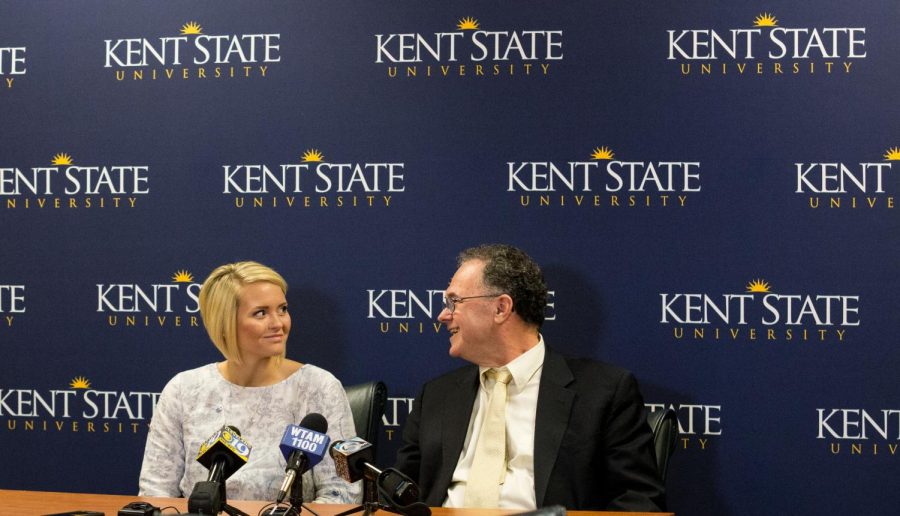Opinion: Recounting the Brussels bombings
Alana Biles, a junior economics major, and her professor, Donald Williams, attend a media conference to address the attacks in Brussels, Belgium, on Wednesday, March 30, 2016.
March 30, 2016
On March 22, I stood on the streets of Brussels, Belgium, and listened to the bells toll. The sound overpowered the unusually empty streets, but even those that passed by talked in hushed tones and walked with purpose. Earlier that day, terrorists decided to strike the city’s airport and metro system, an attack presumably in response to the capture of Sarah Abdeslam, a suspect in the Paris attacks. The attacks killed over 130 and wounded hundreds others.
Touring Europe for an economics course, classmates and I were seated in the National Bank of Belgium, listening to a presentation from an employee. A student in the class slid his phone over to me and a CNN update broke the news: Brussels’ airport had been attacked. Minutes later, another update appeared on his phone; the attacks moved to the heart of the city at the Maelbeek metro station. After hearing of the news, the presenter hurriedly finished the PowerPoint and we were ushered out of the building to return to our hotel. The walk was sobering, as the typically bustling streets of Brussels were now eerily vacant.
It’s still difficult to find the right word for how we initially felt after the attacks. For some students, it’s fair to assert that they were panicked. For myself and others, it was more discomfort than fear. It appeared as if no more attacks had been planned, but uncertainty gripped us. If there was another attack, where would it be? How would they carry it out? Predicting the behavior of such cowardly, inhumane culprits is impossible, but it’s a reality we now faced.
After safely reaching the hotel, we congregated in the hotel lobby to talk about what happened. Our professor discussed the events that occurred earlier in the day, and he did so with an ideal demeanor. On one hand, it was evident that he needed to calm several students in the class who were visibly shaken by the situation. On the other hand, it was clear that he wouldn’t let the heinous acts of ISIS shorten our experience abroad. The next morning, we were leaving for Luxembourg City, as planned.
Collectively, we understood that staying in the hotel for a portion of the day was necessary. We crammed into one room to pass the time until a student came to a harrowing realization: 24 hours ago, we were at the Maelbeek station, scheduled to be there just three hours after our visit at the National Bank of Belgium. In retrospect, it was a miracle that we left unscathed.
That evening, we left the hotel to explore. The streets were much busier than anticipated, but the consequences of the attacks earlier in the day lingered. Many shops were closed, reporters wandered in search of interviewees, and—perhaps most unforgettably—the military was now present in the streets. One thing seemed certain: Belgium, along with the rest of Europe, would need to adjust to the threat of ISIS.
In Luxembourg City, I struck up conversation with a man from Brussels. Unprompted, he mentioned that he was troubled by the bombings, the largest in Belgium’s history. He explained that from an American perspective, I must be desensitized after watching mass shootings and other acts of terrorism on U.S. soil grip the news. He emphasized that Belgium is entering unchartered territory, but most importantly, he also highlighted that life couldn’t stop—that terrorism couldn’t hinder Brussels’ flair for life.
That was the resiliency that I hoped for.
Hours after the attacks, Donald Trump incorrectly tweeted “Do you all remember how beautiful and safe a place Brussels was. Not anymore, it is from a different world!”
On the evening of the attacks, the Grand Place still attracted Belgians and tourists alike—with peopling walking the streets—and the warm weather still coaxed the public onto crowded outdoor patios of cafes that remained open for that day. The attacks weren’t ignored, but the Belgians weren’t going to let ISIS rob the city of its identity. Brussels was still beautiful, even on the city’s ugliest day.
Being in the city during the attacks and witnessing the aftereffects, I’m certain of one thing: ISIS and its perverse agenda can only temporarily instill fear into Belgians. Ultimately, the small nation won’t change its ways in the face of terrorism. The irrepressible spirit of Brussels will prevail, and the rest of the world should take notice of its recovery.
Lucas Misera is a columnist for The Kent Stater. Contact him at [email protected].
Lucas Misera is a columnist for The Kent Stater. Contact him at [email protected].












